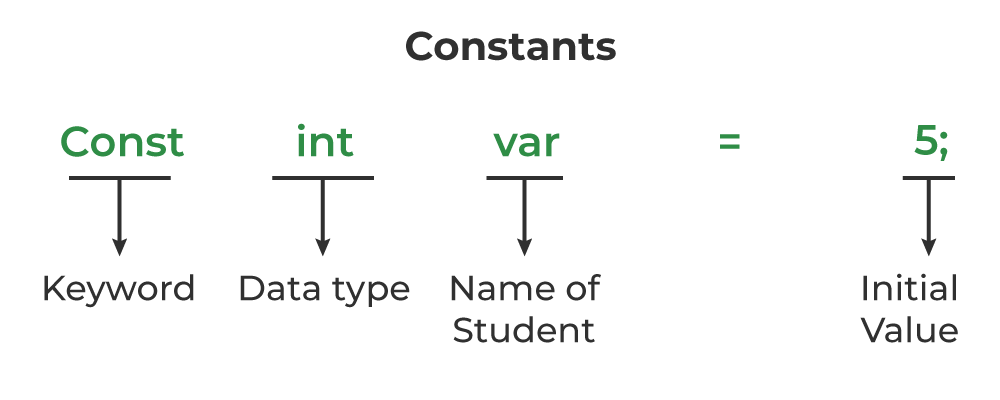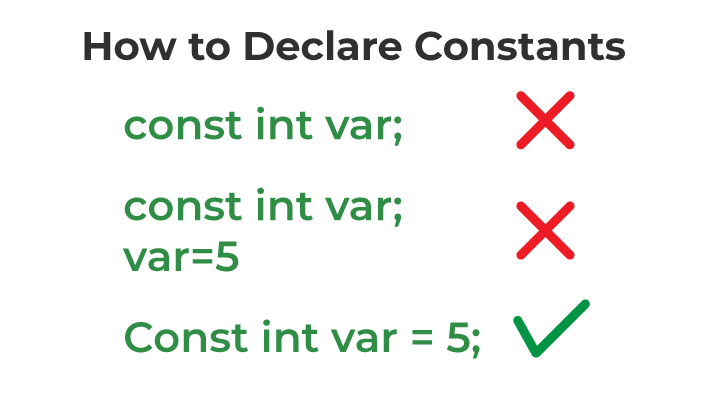Constants in C
Last Updated :
08 Jan, 2024
The constants in C are the read-only variables whose values cannot be modified once they are declared in the C program. The type of constant can be an integer constant, a floating pointer constant, a string constant, or a character constant. In C language, the const keyword is used to define the constants.
In this article, we will discuss about the constants in C programming, ways to define constants in C, types of constants in C, their properties and the difference between literals and constants.
What is a constant in C?
As the name suggests, a constant in C is a variable that cannot be modified once it is declared in the program. We can not make any change in the value of the constant variables after they are defined.
How to Define Constant in C?
We define a constant in C language using the const keyword. Also known as a const type qualifier, the const keyword is placed at the start of the variable declaration to declare that variable as a constant.
Syntax to Define Constant
const data_type var_name = value;

Example of Constants in C
C
#include <stdio.h>
int main()
{
const int int_const = 25;
const char char_const = 'A';
const float float_const = 15.66;
printf("Printing value of Integer Constant: %d\n",
int_const);
printf("Printing value of Character Constant: %c\n",
char_const);
printf("Printing value of Float Constant: %f",
float_const);
return 0;
}
|
Output
Printing value of Integer Constant: 25
Printing value of Character Constant: A
Printing value of Float Constant: 15.660000
One thing to note here is that we have to initialize the constant variables at declaration. Otherwise, the variable will store some garbage value and we won’t be able to change it. The following image describes examples of incorrect and correct variable definitions.

Types of Constants in C
The type of the constant is the same as the data type of the variables. Following is the list of the types of constants
- Integer Constant
- Character Constant
- Floating Point Constant
- Double Precision Floating Point Constant
- Array Constant
- Structure Constant
We just have to add the const keyword at the start of the variable declaration.
Properties of Constant in C
The important properties of constant variables in C defined using the const keyword are as follows:
1. Initialization with Declaration
We can only initialize the constant variable in C at the time of its declaration. Otherwise, it will store the garbage value.
2. Immutability
The constant variables in c are immutable after its definition, i.e., they can be initialized only once in the whole program. After that, we cannot modify the value stored inside that variable.
C
#include <stdio.h>
int main()
{
const int var;
var = 20;
printf("Value of var: %d", var);
return 0;
}
|
Output
In function 'main':
10:9: error: assignment of read-only variable 'var'
10 | var = 20;
| ^
Difference Between Constants and Literals
The constant and literals are often confused as the same. But in C language, they are different entities and have different semantics. The following table lists the differences between the constants and literals in C:
| Constants are variables that cannot be modified once declared. |
Literals are the fixed values that define themselves. |
| Constants are defined by using the const keyword in C. They store literal values in themselves. |
They themselves are the values that are assigned to the variables or constants. |
| We can determine the address of constants. |
We cannot determine the address of a literal except string literal. |
| They are lvalues. |
They are rvalues. |
| Example: const int c = 20. |
Example: 24,15.5, ‘a’, “Geeks”, etc. |
Defining Constant using #define Preprocessor
We can also define a constant in C using #define preprocessor. The constants defined using #define are macros that behave like a constant. These constants are not handled by the compiler, they are handled by the preprocessor and are replaced by their value before compilation.
#define const_name value
Example of Constant Macro
C
#include <stdio.h>
#define pi 3.14
int main()
{
printf("The value of pi: %.2f", pi);
return 0;
}
|
Output
The value of pi: 3.14
Note: This method for defining constant is not preferred as it may introduce bugs and make the code difficult to maintain.
FAQs on C Constants
Q1. Define C Constants.
Answer:
Constants in C are the immutable variables whose values cannot be modified once they are declared in the C program.
Q2. What is the use of the const keyword?’
Answer:
The const keyword is the qualifier that is used to declare the constant variable in C language.
Q3. Can we initialize the constant variable after the declaration?
Answer:
No, we cannot initialize the constant variable once it is declared.
Q4. What is the right way to declare the constant in C?
Answer:
The right way to declare a constant in C is to always initialize the constant variable when we declare.
Q5. What is the difference between constant defined using const qualifier and #define?
Answer:
The following table list the differences between the constants defined using const qualifier and #define in C:
| They are the variables that are immutable |
They are the macros that are replaced by their value. |
| They are handled by the compiler. |
They are handled by the preprocessor. |
| Syntax: const type name = value; |
Syntax: #define name value |
Q6. Is there any way to change the value of a constant variable in C?
Answer:
Yes, we can take advantage of the loophole created by pointers to change the value of a variable declared as a constant in C. The below C program demonstrates how to do it.
C
#include <stdio.h>
int main()
{
const int var = 10;
printf("Initial Value of Constant: %d\n", var);
int* ptr = &var;
*ptr = 500;
printf("Final Value of Constant: %d", var);
return 0;
}
|
Output
Initial Value of Constant: 10
Final Value of Constant: 500
Related Article – Const Qualifier in C
Share your thoughts in the comments
Please Login to comment...